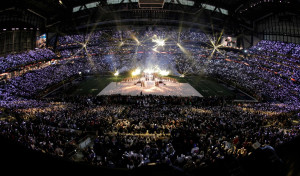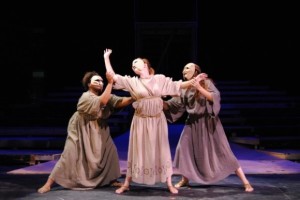Blog
The Super Bowl and Dionysus

I was talking with some friends about the upcoming Super Bowl match, which I’m not particularly excited about, and we were talking about the half time show and I said, “I think they should perform a full Greek tragedy for the half time show. Euripides’ Medea for example would make for great viewing.” The game stops, everyone gets their beer refilled, grabs a hotdog and then buckles in for two hours of show stopping, poison your kids to spite your husband style ancient Greek tragedy, complete with the Greek chorus of course.
We all had a laugh at the thought and the conversation turned to other things but I was thinking of Greek tragedy the next day and, although the super bowl may never be the appropriate place for it, I was thinking of resurrecting the idea. Early Greek tragedy was commissioned for an annual religious festival in honor of the god Dionysus and the plays contemplated the “big themes” of humanity. Honor, love, death, fate, free-will, etc.
 I’ve been thinking for a long time that I’m not totally satisfied just producing concerts of music. I’ve been looking for something that would be more far-reaching and intellectually satisfying and the idea of a kind of Greek festival really appeals to me. Assuming there were money for something like this, I’d commission artists, playwrights, choreographers and musicians to make works of art that are updates on the questions asked by the famous playwrights of old.
I’ve been thinking for a long time that I’m not totally satisfied just producing concerts of music. I’ve been looking for something that would be more far-reaching and intellectually satisfying and the idea of a kind of Greek festival really appeals to me. Assuming there were money for something like this, I’d commission artists, playwrights, choreographers and musicians to make works of art that are updates on the questions asked by the famous playwrights of old.
It would be a five day event and, though it would not commence with the sacrifice of a bull as the Greek festival did, I’m sure we could find something equally fun to kick it off. People would be entertained but they would also be challenged to think about what they saw and heard. In ancient Greece the tragic conflict is often between hubris or rash behavior and the order laid down to man by the gods, or it is a prophecy that foretells some horrible thing that the participants cannot escape.
But always it is more than the sum of its parts. A Greek tragedy is never about what it’s about, to paraphrase Roger Ebert, but is instead meant to provoke questions. Do we have free will? Is there a natural order or behavior that man must comply with or risk punishment? If not from the gods then from other humans. These are the questions that my quasi-Greek festival will explore. Once I get the funding and get it up and running of course. I’ll put it on the to do list and we’ll see when it happens…
- Written by: Seth Boustead
- On: January 13, 2014
News
-
Two New Scores on this Year’s ‘Sound of Silent Film Festival’
I have two new scores on this year’s Sound of Silent Film Festival! The pieces are scored for flute, clarinet, Read More
-
Seth and Gene’s Excellent Electro-Acoustic Adventure Begins at Westbeth March 8
I’m going on tour with my friend Gene Pritsker and it all starts this Saturday night at the famous Westbeth Read More
-
‘Devil’s Food Cake’ Performance in Holland Michigan
We’re taking the Sound of Silent Film Festival on the road to Holland, Michigan where we’re presenting it with Hope Read More
-
New Piece for Viola and Percussion Premiered on January 24
My new work Hurry Up and Wait will be premiered at a Composers Concordance concert of music for viola and Read More
Blog Archives
- July 2022
- June 2022
- April 2022
- March 2022
- January 2022
- October 2021
- September 2021
- August 2021
- February 2021
- November 2020
- October 2020
- June 2020
- April 2020
- January 2020
- December 2019
- November 2019
- October 2019
- September 2019
- July 2019
- June 2019
- May 2019
- April 2019
- March 2019
- January 2019
- December 2018
- November 2018
- October 2018
- September 2018
- August 2018
- July 2018
- May 2018
- April 2018
- March 2018
- February 2018
- January 2018
- December 2017
- November 2017
- October 2017
- September 2017
- August 2017
- July 2017
- June 2017
- May 2017
- April 2017
- March 2017
- February 2017
- January 2017
- December 2016
- November 2016
- October 2016
- September 2016
- July 2016
- June 2016
- May 2016
- April 2016
- March 2016
- February 2016
- January 2016
- December 2015
- November 2015
- October 2015
- September 2015
- August 2015
- July 2015
- June 2015
- May 2015
- April 2015
- March 2015
- February 2015
- January 2015
- December 2014
- November 2014
- October 2014
- September 2014
- August 2014
- July 2014
- June 2014
- May 2014
- April 2014
- March 2014
- February 2014
- January 2014
- December 2013
- November 2013
- October 2013
- September 2013
- August 2013
- March 2011
- August 2010
- May 2010
- October 2009



Leave a Reply